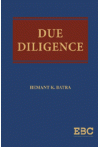- Author(s): Hemant K Batra
- Publisher: Eastern Book Company
- Edition: 1 Ed 2019
- ISBN 13 9789388206549
- Approx. Pages 116 + Contents
- Format Hardbound
- Approx. Product Size 24 x 16 cms
- Delivery Time 3-5 working days (within Kerala & South India) (Others 7-9 days)
- Shipping Charge Extra (see Shopping Cart)
............................................................................................
Description
In the ordinary course, it would be considered sufficient to use the expression "diligence" singly. That is what actually happens in the day-to-day routine practice. We all say, "I have done this work diligently" or "Please exercise diligence while undertaking this work". None would normally say, "I have been due diligent in doing this work". The term is used singly and it manifests assiduousness. What does diligence mean? It means carefulness or thoroughness in relation to any task and activity. In relation to any commercial activity, it may mean industriousness, caution or meticulousness. But to precede it with the word and formulation called "due" makes diligence more accented. In other words, "diligence" gets highlighted and emphasised in combination with "due". The expression "due" encompasses the proper and obligatory diligence.This primer edition discusses holistically yet textually the manifestation and path of due diligence from a legal and business perspective. In every aspect of business, commerce, and trade, due diligence holds a significant locus. The process of due diligence is a gateway to any new opportunity, whereas the lack of it is a getaway from the same. Historically, care and caution were always measured as an integral part of any action. Anything, which involved stake of human lives or monetary facets had to have a forgoing analysis of risks attached therewith. No wars and battles were ever fought without in-depth combat assessments. No fiscal investments were interminably made without a proper evaluation. Due diligence has been in existence for centuries and epochs, though called by different names like assessment, evaluation, appraisal, estimation, analysis, pre-plans, review, projections and more. With the passage of time, the whole structure of pre-planning in relation to commerce and business got to be more organised. It became formalised and was branded as "due diligence". It became an essence of any commercial start-up, be it a transaction, facility or services
............................................................................................
Table of Contents
1. Understanding the Meaning of the Simple Dual or Combo Word Named "Due Diligence"
2. Why Do Due Diligence?
3. Who Needs Due Diligence?
4. Findings of Due Diligence
5. Practicing Due Diligence
6. Due Diligence Review and Result Reporting
7. Sample Due Diligence Checklist
Subject Index
Book Reviews
............................................................................................
Author Details
Hemant K. Batra is a Strategist Business, Corporate, Commercial, and Policy Lawyer, with the law and policy practice concentrated across the globe in general, and specifically in India, for nearly three decades. He is the founder of Kaden Boriss, a network of a global corporate, commercial, and business law practitioner firms. He is also fond of writing and speaking on current topics of importance, be it on legal or policy or social and economic issues. He is a well-ac- claimed writer with five books to his authorship. He was awarded the prestigious Mahatma Gandhi Seva Medal by the Gandhi Global Foundation. He is the elected vice-president of SAARCLAW (South Asian Association for Regional Cooperation in Law). He is associated with various projects of UN, UNDP, UNAIDS, UN-ESCAP, and ADB. He is chair of the South Asia Committee of Indian National Bar Association. He is a mentor at several prestigious schools of business and a lifetime member of the General Assembly of the Union of International Association (UIA), a research institute and documentation centre, based in Brussels. It was founded over 100 years ago, in 1907, by Henri La Fontaine (Nobel Peace Prize laureate of 1913) and Paul Otlet, a founding father of what is now called information science. The UIA has consultative status with ECOSOC and associate status with UNESCO.

